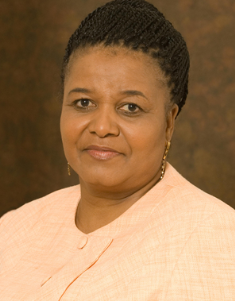
Minister of Water and Environmental Affairs Mrs Edna Molewa is confident of a lasting solution to the water shortages in Grahamstown and surrounding areas that have seriously affected the Rhodes University in the Eastern Cape. The Department of Water Affairs (DWA) together with the Makana Local Municipality and other stakeholders is intensifying efforts to restore permanent water supply as a matter of urgency.
According to Minister Molewa the Department has committed resources including funding and expertise to address the problems. Long and Short term interventions are being led by DWA, among these is the dispatching of the Rapid Response Unit which is already on the ground, the deployment of water tankers to Rhodes University and the affected areas is also taking place. DWA has at the same time assigned Amatola Water Board to support the Makana Local Municipality.
New pumps are in the process of being brought in to replace the existing ones but in the meantime intense efforts are underway to minimize to effects of the shortages. “It is regrettable that the communities around Grahamstown and the Rhodes University community have had to endure the inconveniences that result from this type of water shortage, however I want to give my assurance that the situation is now under control”, added the minister.
Grahamstown has two water schemes connected by ring mains such that the majority of the city can be served by either of the schemes. Both schemes require substantial pumping over the watershed on each side of the city. The two schemes are:
• Waainek Water Treatment Works (WTW), which receives water from
Howisenspoort and Settlers Dams and serves the Western half of Grahamstown, including the Industrial sites and the Rhodes University; and
• James Kleynhans WTW, receiving water from Glen Melville Dam in the Great Fish River catchment, which serves the Eastern half of Grahamstown and most of the townships.
i. The Howisenspoort Pump Station (PS) has had breakages of its pumps coupled with electrical connectivity problems from time to time. These are attributed to the ageing infrastructure. Further delays in restoring water supplies are largely because service providers for pump repairs are based in Gauteng.
ii. Makana Municipality has ensured that water from the second scheme, i.e. James Kleynhans Scheme, was shared over the majority of the city, by opening the ring mains during day and closing them at night. However high water demand exceeded supply from only one plant, and reservoir levels on both schemes declined affecting the higher lying communities on both sides of city
iii. Rhodes University Residences were amongst the high lying areas of Grahamstown worst affected by the water disruptions. Road tankers were deployed to these areas with emergency water. In addition, a dedicated road tanker was assigned to Rhodes University, once the magnitude of the situation was realized therefore delivering water to the header tanks of each affected residents.
With regards to the long-term interventions, the Makana Local Municipality commenced with work that is aimed at increasing the existing capacity. The intention is to increase the capacity of the James Kleynhans Water Treatment Works to meet the estimated 2040 demand. However, this will be done in phases as follows:-
• Phase 1(a) entails the Construction an additional pumping main and 6.6Ml concrete storage reservoir. Construction work is underway to be completed by November 2013.
• Phase 1(b) entails the Augmentation of the James Kleynhans Pump station. Detailed designs are complete and are due for tender soon.
• Phase 2 (Future or long-term) entails the augmentation of the James Kleynhans Water Treatment Works. A feasibility study has commenced and funding has been committed by DWA, under the DWA Regional Bulk Infrastructure Grant (RBIG) and is due for completion at the end of September 2013. The estimated costs for Phase 2 is R66 million.
In addition, DWA is giving support to the Makana Local Municipality through its Accelerated Community Infrastructure Programme (ACIP) on water conservation and water demand management as high water losses and a lack of metering can seriously compromise sustainable water supply especially when water systems are stretched to the limit. The Rapid Response Unit has assessed, costed and repaired the major leakages.
By Minister of Water and Environmental Affairs Mrs Edna Molewa’s Office
